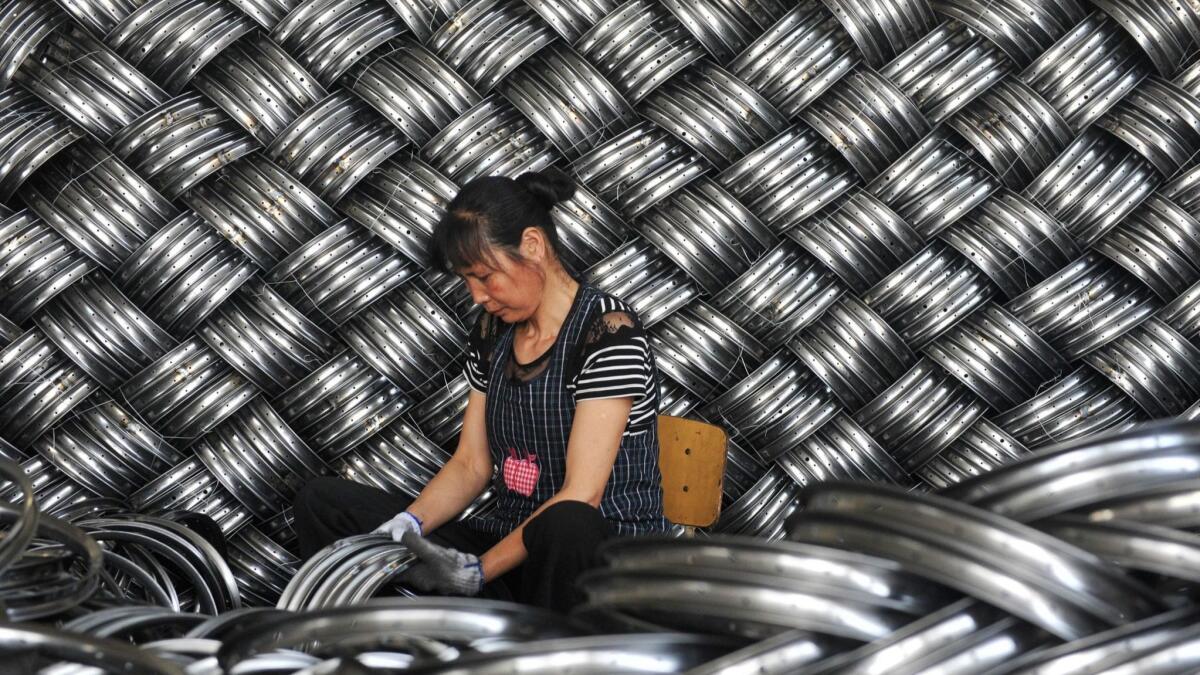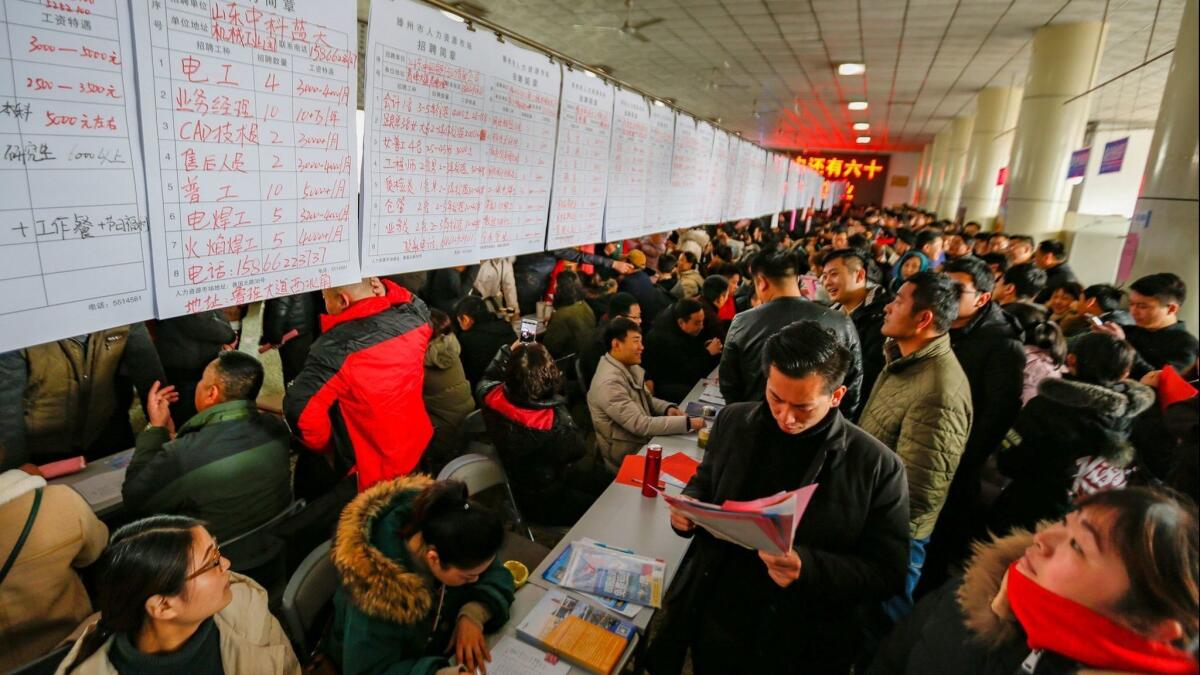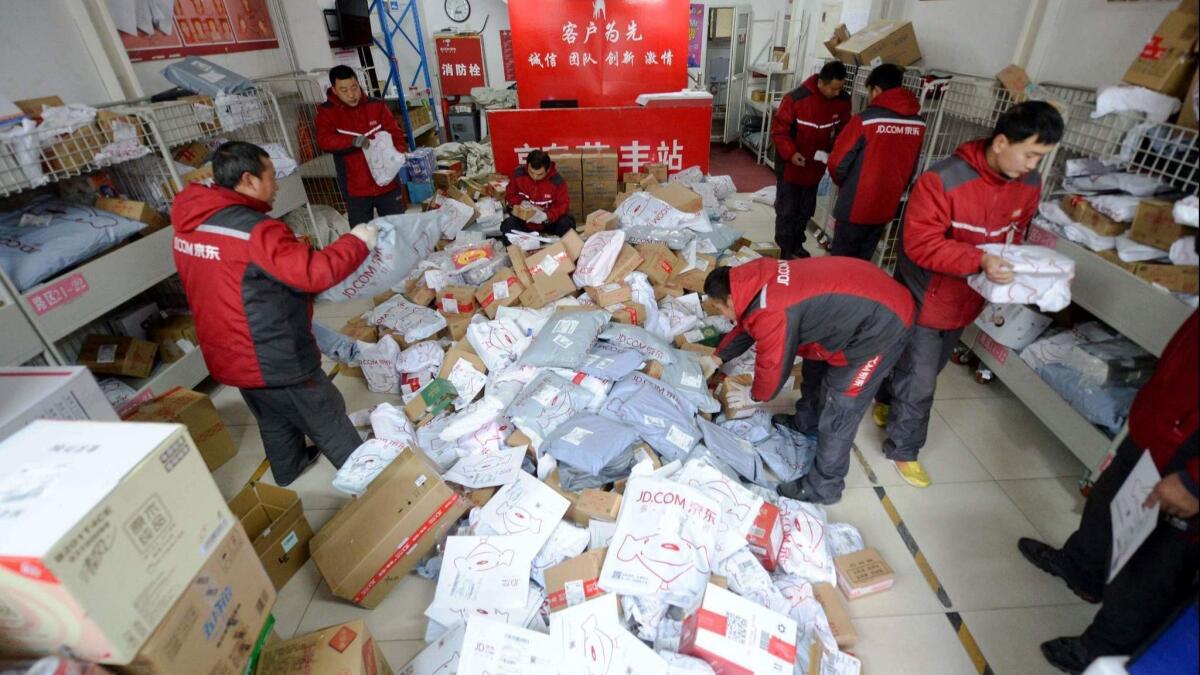Chinese millennials are rejecting dull factory jobs — and transforming the economy

Life as one of China’s industrial worker ants did not suit Liu Xu: waking up early in factory accommodation, working for 11 hours operating a machine in the tool-making factory, eating all his meals in the factory canteen and going to bed, only to wake up and do it again.
His parents spent most of their lives in deadening jobs — his father on construction sites and his mother in factories — but 23-year-old Liu Xu lasted just a year in a factory in the southern China city of Dongguan. Half of that was the time his company invested in training him to work the machine before he up and quit.
Like Liu, a generation of young Chinese is turning its back on the factory jobs that once fueled China’s growth — and they are helping to transform the economy by doing it.
“Life in the factory was really boring and repetitive,” Liu said. “Every day I walked into the factory, I felt like this was all there was to my life. I was going to end up in that factory forever.
“You felt trapped, just walking between three places your whole life: work, the accommodation and the canteen. I couldn’t get used to the working conditions. I had to wear a uniform every day.”
Factory bosses, for their part, disparage Chinese millennials as a lazy, coddled generation, more interested in leisure and material goods than their factory fodder forefathers. The bosses complain it is difficult to find enough new young workers to replace the old — even as China moves from being the world’s cheap low-wage factory capital to a post-industrial economy based on high-tech industries and consumer-driven services.
With an aging population, the workforce is predicted to shrink rapidly — by 100 million every 15 years from 2020 — according to National Committee of Chinese People’s Political Consultative Conference. In the meantime, factory bosses are caught short in finding adequate employees, as some factories automate more quickly than others.
In an automotive components factory in Taishan city, southern China, the hot, muggy air smells of paint. Vice President Li Na walks briskly, her heels tapping on the factory floor like an efficient machine, passing a small glass-walled room where a worker sits on an upturned bucket, spray-painting metal car components on a trundling conveyor belt.
He is an older man, staring out over his breathing mask with dull, bored eyes before turning back to the line.
“Loyal” older workers are becoming harder to find, Li says, as the “spoiled” children of the past one-child policy generation turn their backs on factory jobs.
“If they complain to their parents that they don’t like working in a factory, their parents just tell them to leave the job,” says Li, a perky woman in her 30s whose fingers dance incessantly on her smartphone between answering questions. She says that young workers rarely remain long.

For generations, low-skilled factory jobs were the lifeblood of China’s incredible growth. That improved living standards — but also saw changing job expectations. As the government fosters high-tech industries to tackle U.S. global dominance, cheap, high-volume manufacturers are caught facing higher wages and labor shortages, struggling to compete with nations like Cambodia, Thailand and Vietnam.
“It’s almost impossible to find someone born after the 1990s to come and learn how to do the work,” said Dai Wei Yan, recruiting for a garment manufacturer at a job fair in Dalang, a city 14 miles southwest of Dongguan. Two decades ago, nearly all its staffers were in their 20s. Now almost none are.
“Younger people are getting better jobs through higher education, or they are learning specific skills like cooking, or starting up their own businesses,” he said. His company now sends products to factories in Vietnam and Cambodia for finishing, to cut labor costs.
Dongguan is a sprawling manufacturing hub in the heart of the Pearl River Delta that churns out electronics, computer parts, shoes and furniture, exporting $104 billion in products a year. Red LED signs outside box-like factories beam out siren calls to try to attract workers: “We are actively hiring” and “Join us.”
Older male job-seekers from out of town squat on the sidewalk outside factories with their bags and suitcases. Some ply the streets dragging their wheeled suitcases, looking for the best wages and conditions. At noon, they throng to cheap cafes with low plastic stools for hot soupy noodles.
But while most older workers are looking for permanent work, millennial job-seekers acknowledge they are looking for only a few months of work as a stepping stone to something better — such as a start-up small business of their own.
Some of the factories are like small towns, with workers’ accommodations strung with row after row of drying laundry. Others are just small family-run affairs — but all are struggling to find enough willing laborers.

On a street corner in Dongguan’s industrial zone, a young couple peppers recruiting agent Huang Wen Cheng with questions about conditions in the factories he represents.
“You have to stand for 12 hours. You can’t sit down. You get used to it after the first week, and then you will be fine,” he urges them, but they drift away.
“Workers are getting really picky. They are asking if they have to stand or if they can sit,” Huang says. “As far as I know, almost all the factories around here you have to stand at the production line, and it’s really long hours, from 8 a.m. to 9 p.m. or 10 p.m.”
The term millennials often conjures up the privileged, upwardly mobile university-educated youth of China’s big cities. But lower-skilled, less-educated young workers are equally important to China’s shift to an economy geared to domestic consumption and services.
Chinese millennials are often surveyed by business consultants and marketers eager to figure out the secrets of the generation driving Chinese consumption: They tend to be entrepreneurial; “happiness seekers”; and want fulfillment, not just financial stability, in their work.
According to business consultancy Brunswick, 97% of Chinese millennials would prefer to work for a company whose values were similar to their own. They live on their smartphones, online shopping, playing video games, browsing social media, ordering e-restaurant deliveries and livestreaming videos.
Liu graduated after three years of technical college, and is happy to do low-skilled work — as long as he does not have to work in a factory — hence his decision to give up his factory job despite six months’ training to operate precision metal production equipment.
He grew up the son of impoverished, rural farmers who left their home village to find work. His father was a construction site laborer, and his mother was a factory worker. The pay was low, but they worked hard and sacrificed everything for him.
When he told them he hated his Dongguan factory job, they supported his decision to quit, “because no parents want their kids to work in a factory for someone else their whole lives.
“I felt I was capable of doing something better,” he said.
Liu sits behind a counter in a courier company, surrounded by stacks of boxes and parcels. The business is piggybacking on China’s gargantuan, fast-growing online shopping industry. His job, packing and sending parcels, is easy compared with operating a precision metal machine. It pays him $820 a month — $74 more than the factory paid.
“Here, I don’t feel so much pressure. The job is really simple,” he says.
The hours are still long, but he can relax and spend time surfing the internet on his smartphone when it’s quiet. He sleeps in a room above the shop.
“If you work in a factory, there are so many tiny rules and regulations you have to obey,” he says. “This is freedom.”
Liu’s shift reflects the growing role that the service sector is playing. The government says that growth in services like e-commerce and finance will flip the nation’s primary reliance on labor-intensive heavy industry, a tectonic shift already seen in the numbers: Manufacturing accounted for 47% of GDP in 2010 but only 40% in 2017 — when services accounted for more than 50%. In the first half of 2018, services contributed 60.5% of China’s economic growth and accounted for 45% of employment, according to state-owned news agency Xinhua.
Liu aims to start his own small business. “I want to learn how to do barbecue or how to cook because I’m a foodie. I’d love to have my own little restaurant.”
Ma Jinhang, 45, resigned his job at a provincial electricity company in Xining city in Qinghai province, central China, drawn by a shoe factory in distant Dongguan advertising jobs at $615 a month. He traveled 36 hours on the slow train, only to find the salary was actually $450.
He quit after two months and now hangs disconsolately around outside a low-cost, multistory migrant hostel where small children totter, kittens gambol and a handful of migrant workers chatter.
“They’re all liars,” Ma says angrily, railing at the shoe factory bosses. “I left because the salary was so low — too low. It was unbearable. And it was 13 hours a day.
“The supervisors were always bothering you, ‘Work faster, work faster.’ The meals were terrible. I felt as if they were raising livestock.
“I’m going back to Xining,” he says. “I’d rather be a street cleaner in my hometown than work in this inhuman environment.”

Yang Qiang, 24, zips along on a motor scooter, wearing a yellow helmet, one of an army of deliverymen in a $35-billion e-commerce and food delivery business. He grew up as a farmer’s son in rural Hunan and arrived in Dongguan after graduating high school, at first working in a shoe factory, pairing and packing shoes for $447 a month.
“The pay was terrible,” he says. “It was so repetitive and soul-destroying and boring. If you stayed for a long time in the factory, you might as well be dead. You’d have given up your life for the company.”
Around him were older workers who “did not have the guts to leave, despite the bad working conditions.
“There was no freedom.”
As a motorcycle deliveryman, he more than doubled his factory pay, earning $1,194 a month. He is saving to start a business.

Manufacturing wages in China have increased five-fold since 2005 according to the Deloitte 2016 Global Manufacturing Competitiveness Index, while wages remain much lower in nations like Vietnam, Thailand, and Indonesia. Li’s factory cut staff from 400 workers to 300 through automation last year.
“Labor costs are high in China these days,” Li says. “In the future, greater automation is a must if our company is to continue to grow. We’ll spend more on new machinery. Our workforce will shrink further. Many other companies in the region are also doing the same.”
Zhou Qiyin, 33, worked his way up to manager in a large precision tools factory, and started his own small factory two years ago. He cannot interest young people in learning how to operate his precision metal machines.
“There are many families who are not willing to let their kids work in a factory,” he said. “Kids these days don’t want to work too hard because they can have an easy life and go out for meals.”
But for China, it’s all part of the plan. Let someone else be the world’s cheap factory. Its 400-million-strong millennial generation, with better pay and more free time to spend money, is driving the transformation of the economy.
“Because of the economy going up in recent decades, every family is rich enough to give their one child a good life. Now, young kids want to play,” Hayes Lou, head of the Taiwan Business Assn. of Dongguan, says of millennials. “They want an easy life, easy money. They don’t want to work in a factory.”
Gaochao Zhang from the Times Beijing Bureau contributed to this story.
Talks with China may lead to long-promised deal — or all-out trade war »
Twitter: @RobynDixon_LAT
More to Read
Start your day right
Sign up for Essential California for news, features and recommendations from the L.A. Times and beyond in your inbox six days a week.
You may occasionally receive promotional content from the Los Angeles Times.






